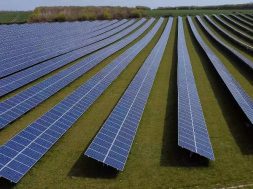
J. v. G. Thoma GmbH completes two new robot layups for DESERT solar panel production in Turkey
J. v. G. Thoma, the Bavarian-based solar power specialists, are pleased to announce the final acceptance of two robot layups for DESERT solar panel production in Turkey that will create 240 MW of solar panels in total. The compact robot layups, which are now ready for packing and transport, load the glass onto the panels automatically, an innovative technological approach that brings economic, technical and operational benefits to the production of DESERT photovoltaic panels.
Turkey enjoys an advantageous position for the generation of solar power when compared to the rest of Europe, with an average insolation of around 7.2 hours per day. The Turkish government plans to generate 3 GW by 2023 and the country’s photovoltaic production is set to grow dramatically over the next few years. The hot summer temperatures often experienced in parts of Turkey would have posed a challenge to traditional solar panels, which are designed for the more moderate climate of northern Europe, but J. v. G. Thoma’s DESERT technology can cope with a range of extreme stresses, such as continuous temperatures of up to 125 °C, sandstorms, strong winds and high levels of humidity.
The DESERT (HPTP process technology) panels also offer yields of up to 5% more than conventional solar panels. Furthermore, DESERT panels are PID free: PID (potential-induced degradation) is an undesirable effect that is often seen at high temperatures in crystalline photovoltaic modules. It is caused by so-called stray currents and may lead to power losses of up to 80 percent.
After almost two decades of experience in the field, J. v. G. Thoma is now the leading German manufacturer in solar technology and the company has worked with numerous renowned businesses across Europe, Asia and the Americas. With the delivery of the DESERT robot layups, the latest technological developments from J. v. G. Thoma are set to play an important role in the growth of Turkey’s renewable energy programme.













